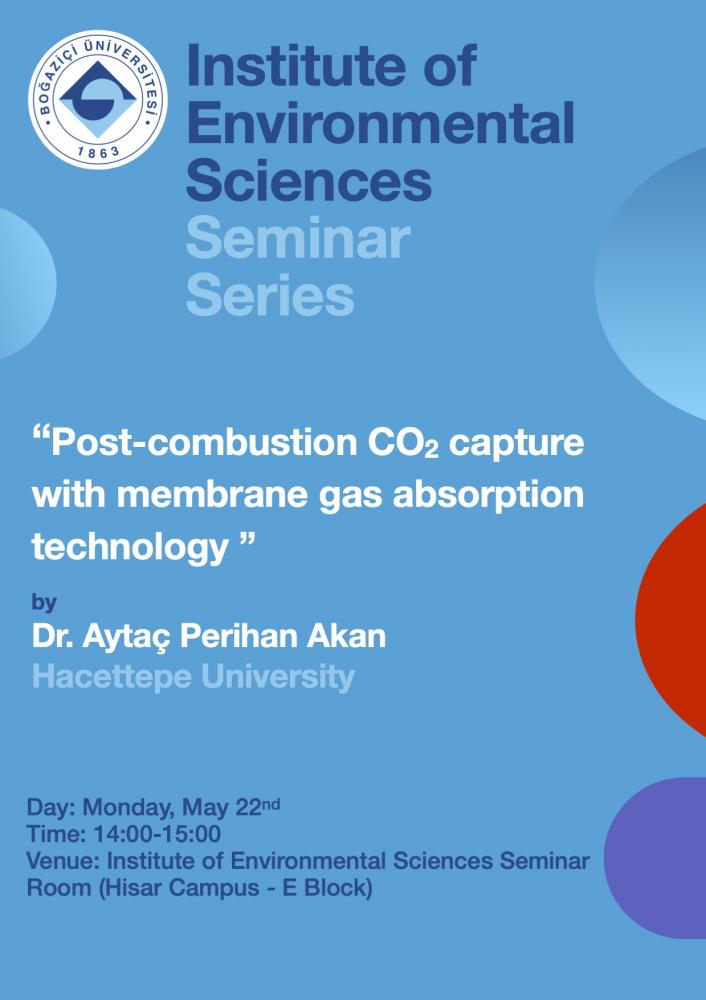IESc Seminar Series: Post-combustion CO2 capture with membrane gas absorption technology- By Dr. Aytaç Perihan Akan

Institute of Environmental Sciences Seminar Series
“Post-combustion CO2 capture with membrane gas absorption technology”
By Dr. Aytaç Perihan Akan
Hacettepe University
We cordially invite you to our seminar “Post-combustion CO2 capture with membrane gas absorption technology” by Dr. Aytaç Perihan Akan, Hacettepe University.
When: 22 May, Monday, 14:00-15:00
Where: Institute of Environmental Sciences Meeting Room
Contact: pinar.ertor@boun.edu.tr for any questions.
Abstract:
The increase of carbon dioxide concentration in the atmosphere owing to fossil fuel usage, and its implications on global warming, are now commonly admitted. CO2 concentration is expected to double around 2050, if no special actions are taken. Among the different options to mitigate CO2 emissions, carbon capture and storage (CCS) is considered a remarkable technique. Gas absorption and stripping using membrane contactors is one of several CCS technologies being investigated to separate CO2 from flue gas. Energy consumption in CO2 absorption-stripping employing amine-containing aqueous absorbent solutions is strongly influenced by demanding stripping conditions involving higher temperatures. The utility of using pure methyldiethanolamine (MDEA) activated by piperazine as a reactive absorbent was studied using a module containing a microporous polypropylene cross-flow hollow fiber membrane coated with fluorosiloxane on the outer surface of fibers; such a module was used for both absorption and stripping. Water needed for reactive absorption of CO2 in tertiary amine MDEA was obtained from a simulated humidified flue gas stream which is saturated with moisture in actual practice. This study investigated also the absorption and stripping performances of aqueous absorbent solutions containing 80% and 90% activated MDEA (aMDEA). Results are reported for the performance of the absorption-stripping process as a function of humidified simulated flue gas flow rate, the absorbent flow rate, the concentration of the absorbent, and the type of the stripping mode (sweep He, vacuum, or the combination of both called as combo-mode). Considerable CO2 stripping from CO2-loaded pure aMDEA absorbent was achieved at 92 oC while absorption was carried out at 25-46 oC. High values of the overall mass transfer coefficients (MTCs) have been reported for absorption. The highest volumetric gas phase-based overall MTC obtained was 0.504 sec-1. Further, the CO2 stripping rate was far higher for pure aMDEA compared to the other two aMDEA solutions with water. This system has a much lower absorbent circulation load, eliminates the energy needed to heat and evaporate water present in aqueous absorbent solutions, and benefits from the absence of excess water during stripping.
About Aytaç Perihan Akan:
 Dr. Aytac Perihan Akan has been working as a researcher and lecturer at Hacettepe University, Turkey, Department of Environmental Engineering. She received her B.Sc. degree from Trakya University, Turkey, Department of Environmental Engineering in 2008 as the highest-ranked student at the Faculty of Engineering. She received her M.Sc. degrees from Boğaziçi University, Turkey, Institute of Environmental Sciences, Environmental Technology Division, and from Hacettepe University, Industrial Engineering - Quality and Conformity Assessment Engineering Department in 2014 and 2016, respectively. She got her Ph.D. degree from Hacettepe University, Environmental Engineering Department, in 2019. She implemented her Ph.D. thesis studies at the New Jersey Institute of Technology, USA, Chemical and Materials Engineering Department between 2018 and 2019 on membrane-solvent hybrid systems for post-combustion CO2 capture. She also worked as a visiting researcher at Universite Catholique de Louvain, Belgium, Materials and Process Engineering Department in 2018 on the life cycle assessment of CO2 Capture for further reuse as sodium carbonate. She was a postdoctoral research fellow at Middle East Technical University, Turkey, Chemical Engineering Department between February 2020 and September 2021 on the fabrication and characterization of polymeric membranes. Her research areas cover air pollution control, membrane technologies, life cycle assessment, and renewable energy systems. Currently, she also focuses on the phytoremediation and biomonitoring of heavy metals, and heavy metal sorption by microalgae.
Dr. Aytac Perihan Akan has been working as a researcher and lecturer at Hacettepe University, Turkey, Department of Environmental Engineering. She received her B.Sc. degree from Trakya University, Turkey, Department of Environmental Engineering in 2008 as the highest-ranked student at the Faculty of Engineering. She received her M.Sc. degrees from Boğaziçi University, Turkey, Institute of Environmental Sciences, Environmental Technology Division, and from Hacettepe University, Industrial Engineering - Quality and Conformity Assessment Engineering Department in 2014 and 2016, respectively. She got her Ph.D. degree from Hacettepe University, Environmental Engineering Department, in 2019. She implemented her Ph.D. thesis studies at the New Jersey Institute of Technology, USA, Chemical and Materials Engineering Department between 2018 and 2019 on membrane-solvent hybrid systems for post-combustion CO2 capture. She also worked as a visiting researcher at Universite Catholique de Louvain, Belgium, Materials and Process Engineering Department in 2018 on the life cycle assessment of CO2 Capture for further reuse as sodium carbonate. She was a postdoctoral research fellow at Middle East Technical University, Turkey, Chemical Engineering Department between February 2020 and September 2021 on the fabrication and characterization of polymeric membranes. Her research areas cover air pollution control, membrane technologies, life cycle assessment, and renewable energy systems. Currently, she also focuses on the phytoremediation and biomonitoring of heavy metals, and heavy metal sorption by microalgae.
